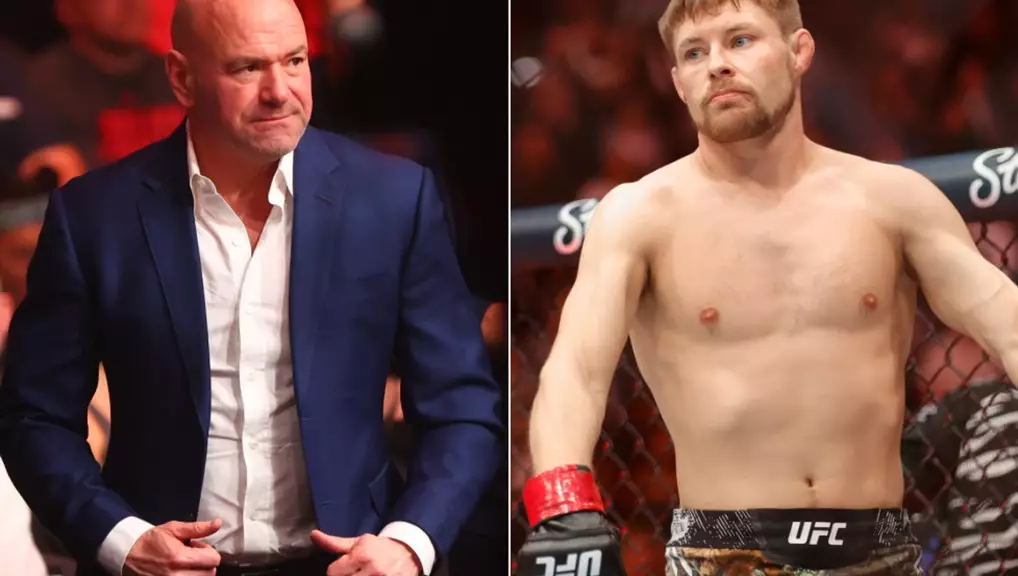In the world of mixed martial arts, fighters often push the envelope, both inside and outside the octagon. One recent incident that stands out centers around UFC fighter Bryce Mitchell and his inflammatory comments about Adolf Hitler during the inaugural episode of his podcast, “ArkanSanity.” UFC president Dana White’s frank tirade against Mitchell’s comments highlights a critical moment for the organization, revealing the challenges faced when personal beliefs clash with corporate values and public opinion.
In his podcast, Mitchell went beyond mere provocation, expressing admiration for Hitler as “a good guy,” while disseminating homophobic rhetoric and Holocaust denial. This blatant disregard for historical truth generated widespread outrage, not only within the realm of the UFC but also across social media platforms. Given the heavy connotations associated with Hitler’s regime, it’s astonishing and deeply troubling that a public figure would make such statements with seemingly no regard for the ramifications.
Dana White’s reaction was notably harsh. He stated, “We’re beyond disgusted,” indicating that even within the generally permissive arena that characterizes the MMA community, there are limits. White went on to declare Mitchell’s remarks as among the “worst” forms of ignorance he’d encountered, highlighting the horrific consequences of Hitler’s actions during World War II. By referencing the millions who lost their lives due to Hitler’s policies, White aimed to ground the conversation in a stark historical context—a context that Mitchell seems to have either ignored or blatantly rejected.
The Fallout and UFC’s Response
Despite the outrage, it appears that Mitchell’s standing with the UFC remains largely unchanged. White clarified that while the UFC had contacted Mitchell to express their disgust, the promotion does not plan to impose disciplinary action, citing free speech as a protective shield. This stance raises critical questions about the balance between freedom of expression and accountability. If fighters can openly express extremist views without repercussions, does it indirectly imply the UFC’s endorsement of those beliefs?
White’s argument that dissenting voices should remain in the public square is valid; however, the lines blur when those voices espouse hate or denial of historical atrocities. The UFC’s historical leniency toward inflammatory remarks made by its fighters might suggest an entity that prioritizes viewership and the spectacle of mixed martial arts over ethical responsibility. Fighters represent not only themselves but their organizations; thus, their statements have a ripple effect that can tarnish reputations built over decades.
The UFC must grapple with the implications of Mitchell’s words. As a rapidly growing global brand, it cannot ignore the backlash from fans and sponsors who may distance themselves from an organization that tolerates hate speech. The promotion has already faced scrutiny in the past for its handling of controversial fighters, making this moment particularly significant for its public relations strategy. White’s dismissal of the need for repercussions can be seen as both a defense of individual rights and a calculated risk, but it also hints at the complex realities that many organizations face in the current socio-political climate.
Should the UFC choose to ignore such incidents, it runs the risk of alienating a significant portion of its fanbase, which may include individuals and communities directly affected by hate speech. Conversely, if the UFC were to impose disciplinary measures, it opens the door to debates about censorship and the cost of political correctness in sports.
As the discussion surrounding Bryce Mitchell’s controversial comments continues, the UFC must navigate a challenging landscape defined by competing values of free speech and social responsibility. White’s robust but ultimately unpunished reaction to Mitchell’s diatribe encapsulates the larger crisis facing not only the UFC but all sports organizations: how to best handle athletes whose views may contradict societal norms and values.
This incident serves as a reminder that the intersection of personal beliefs and public representation is fraught with complexity. While fighters like Mitchell may express their views under the banner of free speech, their words can perpetuate harmful ideologies that echo well beyond the confines of the octagon. As the UFC moves forward, it will be crucial to establish a clearer stance on these matters, lest it find itself caught in a public relations quagmire from which recovery would be difficult.

